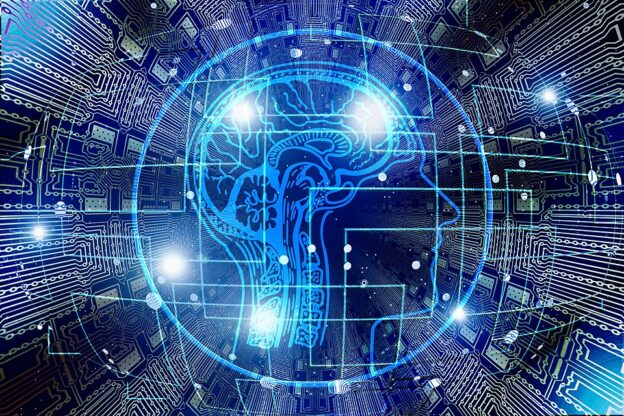White House AI Plan Should Concern Justice-Seekers
Deregulation Will Increase Chances of Future Where Economy and Tech Trump the Common Good
Jarrett Smith
July 30, 2025
 For many people, artificial intelligence (AI) raises anxieties of a future where machines have overtaken humans as the dominant intelligence on our planet, whatever that might take. Is it a new device or a humanoid? Right now, it is up to speculation. For Catholics and other faith-filled justice-seekers, it evokes past moral challenges posed by revolutionary changes where they had to insist on human dignity, the common good, and the dignity of work.
For many people, artificial intelligence (AI) raises anxieties of a future where machines have overtaken humans as the dominant intelligence on our planet, whatever that might take. Is it a new device or a humanoid? Right now, it is up to speculation. For Catholics and other faith-filled justice-seekers, it evokes past moral challenges posed by revolutionary changes where they had to insist on human dignity, the common good, and the dignity of work.
Over 130 years ago, Pope Leo XIII insisted on these principles as the Industrial Revolution took hold. Today, we face even more complex challenges, and a new pope has taken the name Leo in response. In June, the pope said:
“AI, especially Generative AI … raises troubling questions on its possible repercussions on humanity’s … ability to grasp and process reality. Acknowledging and respecting what is uniquely characteristic of the human person is essential to the discussion of any adequate ethical framework for the governance of AI.”
On July 23, the White House released its “Winning the AI Race: America’s AI Action Plan,” a plan that outlines over 90 federal actions to accelerate U.S. AI innovation and global leadership. Executive Orders will implement the AI Action Plan, instructing federal agencies to incorporate its directives into procurement processes and daily operations. Ultimately, President Trump has provided large model AI developers with everything they need to control the future of generative AI.
The Administration’s plan directs federal agencies to favor AI models deemed free of “ideological bias” and mandates the removal of all mentions of diversity, equity, and inclusion (DEI) and misinformation from the National Institute of Standards and Technology (NIST) AI Risk Management Framework. This will only amplify the emerging problems we have already seen with AI spreading false information and all forms of bias, including gender, racial, and geographical. The plan also calls for expedited permitting for data centers, semiconductor fabrication plants, and energy infrastructure, framing these projects as a national priority that overrides “radical climate dogma.” AI infrastructure requires massive amounts of water for cooling and will likely mean redirecting water sources from communities who need them.
This policy emerges during intense global dialogue on AI ethics, exemplified by initiatives like the Rome Call for AI Ethics, which received endorsement from global faith leaders. This initiative, heavily influenced by the Vatican, seeks to ensure that technological progress serves humanity and protects human dignity by treating AI as a profound agent of social transformation that requires ethical management. Unfortunately, the Action Plan diverges from Catholic Social Justice in several critical areas:
Human Dignity vs. Deregulation: The economy and technology must serve people, not the other way around. The plan prioritizes speed and deregulation over safety guardrails, risking deployment of AI systems that could harm vulnerable populations. The explicit removal of DEI and bias considerations from the NIST framework tangibly demonstrates this conflict by de-emphasizing the need to protect against algorithmic discrimination.
The Common Good vs. “Winning the Race”: The plan’s title and substance frame AI development as a nationalistic, zero-sum competition. This approach contradicts the principle of the common good, which calls for social conditions that allow all people and groups to reach their fulfillment. The collaborative, global spirit of the Rome Call stands in stark contrast to the plan’s competitive posture.
The Dignity of Work: The plan includes provisions for worker retraining but prioritizes unleashing innovation with minimal constraints. This approach reflects a preference for capital and technology over labor, which remains misaligned with the consistent call to protect dignity and workers amidst industrial transformations. The focus remains adapting workers to AI, not ensuring AI serves workers.
The White House AI plan also prioritizes geopolitical competition and unconstrained innovation as the primary path to U.S. AI dominance. This conflicts with an ethical framework grounded in Catholic Social Teaching. Moreover, politicizing technical standards could undermine U.S. credibility in global technology governance. If successful, the plan could accelerate U.S. economic growth, spur innovation in critical sectors, strengthen national security by reducing reliance on foreign supply chains, and create high-paying jobs in technology and infrastructure. However, the plan’s core tenets present significant challenges for organizations seeking to align public policy with these foundational values.
What remains is that justice-seekers must grapple with the deep disruption posed by AI in the years ahead. As with the Industrial Revolution centuries ago, we must meet the moral moment. We also have the moral leadership of a pope who sees the challenges clearly. We must continue to push our political leaders to respond.
Image: Public domain via Wikimedia Commons







